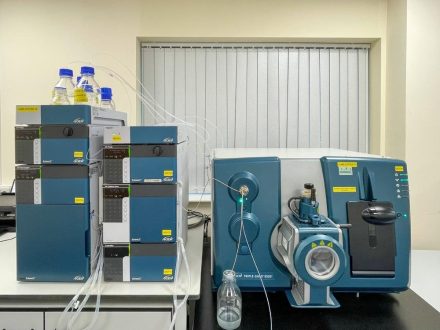Bio2Brain set to develop effective drug delivery to central nervous system
In order to respond to this challenge, the Bio2Brain network will pursue more effective approaches and develop new paradigms for drug delivery technologies in the treatment of CNS diseases.
Disorders of the central nervous system, including multiple sclerosis and Alzheimer’s and Parkinson’s diseases, affect around 165 million people in Europe. These disorders are often associated with severe suffering of the patients and their families, as well as an enormous burden on the social systems. Therefore, the Fraunhofer Institute for Interfacial Engineering and Biotechnology IGB coordinates the establishment of a trans-European research network to promote efficient drug administration to the CNS.
A highly critical challenge in that context is the existence of the blood-brain barrier (BBB), an effective human defence system that protects the CNS from circulating pathogens. However, it also results in a low central availability of drugs in the CNS, especially innovative biopharmaceuticals like monoclonal antibodies (mAbs). As a consequence, drugs with a low CNS bioavailability are currently delivered directly to the CNS via intrathecal, intracerebroventricular, or intraparenchymal injections. Unfortunately, such delivery systems are invasive, require surgery with high risks, have very low patient compliance, and are poorly controllable. Hence, there is a critical need for an effective new approach for drug delivery technologies in the treatment of brain diseases with CNS active molecules.
Trans-European research and training programme with cross-sectional expertise
"We have launched the Bio2Brain network in order to actively shape this change,” explains Dr. Carmen Gruber-Traub, a specialist for functional surfaces and materials at the Fraunhofer Institute for Interfacial Engineering and Biotechnology IGB and the coordinator of the project. The project is a four-year Marie Skłodowska-Curie Action (MSCA) Innovative Training Network (ITN) funded by European Union’s Horizon 2020 research and innovation programme. “We are very pleased that we were selected for funding as these actions are not only very popular but also highly competitive due to the bottom-up approach and the required scientific excellence,” says Dr. Carmen Gruber-Traub.
The Bio2Brain network will create a research environment for the interdisciplinary and intersectoral training of 13 Early Stage Researchers (ESRs) supported by 11 academic teams, 6 key industrial stakeholders, and an academic non-profit organization. Over a duration of 36 months, each ESR will work on their individual research projects (IRPs) in the scientific work packages (WPs) based on the training-through-research principle. A personalised training programme combining local trainings, network training, and international training via conferences and secondments will guide them.
The research and training programme covers the development of new advanced materials, formulations, and engineered proteins for the intranasal CNS delivery of mAbs. The ESRs will obtain experience in the entire transdisciplinary development cycle of the medicinal product, from pharmacological drug pathway validation, product and process design, synthesis to characterization, as well as validation and quality control. The training will be complemented with useful tools for the time to market and commercialisation phase.
Participation of MyBiotech GmbH
The MyBiotech GmbH will employ one ESR who will work on (bio)polymer-based particulate formulations for the intranasal transmucosal delivery of biopharmaceuticals. The ESR will conduct research on developing pharmaceutically approved (bio)polymer based biopharmaceutic delivery systems with tailored transmucosal passage properties.
Bio2Brain project consortium:
Beneficiaries:
- Fraunhofer Institute for Interfacial Engineering and Biotechnology IGB, Germany (Coordinator)
- MyBiotech GmbH, Germany
- Hochschule Biberach, Germany
- Universität Bern, Switzerland
- Laboratorio Europeo di Spettroscopie Non Lineari, Italy
- Centre for Research and Technology Hellas – CERTH, Greece
- Queen Mary University of London, United Kingdom
- University of Cambridge, United Kingdom
- Contipro a.s., Czech Republic
Partner organisations
- Universität Stuttgart, Germany
- Universität Saarland, Germany
- Università degli Studi di Firenze – UniFI, Italy
- Aristotle University of Thessaloniki, Greece
- Beiter GmbH & Co. KG, Sigmaringendorf, Germany
- Vektor Pharma TF GmbH, Germany
- CSL Behring AG, Switzerland
- Boehringer Ingelheim, Germany
- European Academy of Neurology, Austria
MyBiotech GmbH was founded 2016 in Überherrn, Saarland. It is a CDMO offering end to end development, manufacturing services and innovative products for biotech and pharma. At MyBiotech innovative technologies are part of the solution bringing your project one step closer to success.
MyBiotech will contribute the experiences gained so far to the work of the Bio2Brain network.
MyBiotech GmbH
Industriestr. 1b
66802 Überherrn
Telefon: +49 6836 9691145
Telefax: +49 6836 9691199
http://www.mybiotech.de
Geschäftsführer MyBiotech GmbH
Telefon: +49 (6836) 9691-145
E-Mail: d.mueller@mybiotech.de
![]()



